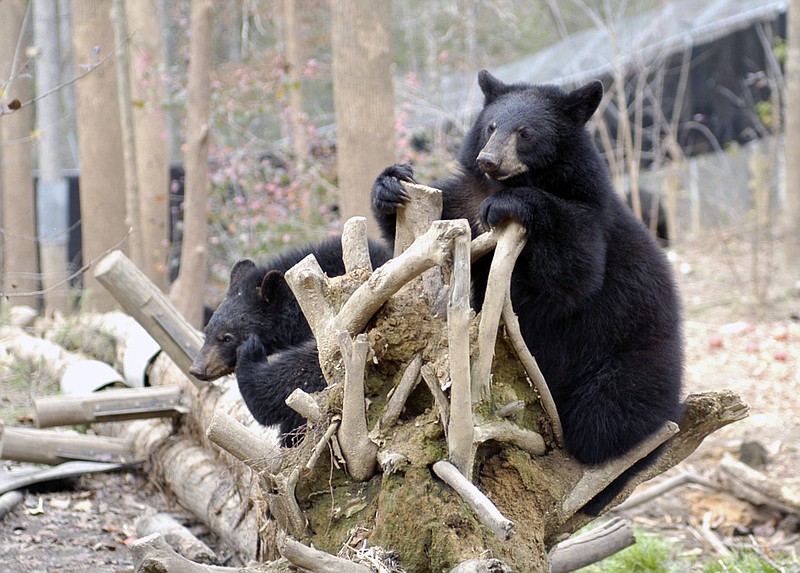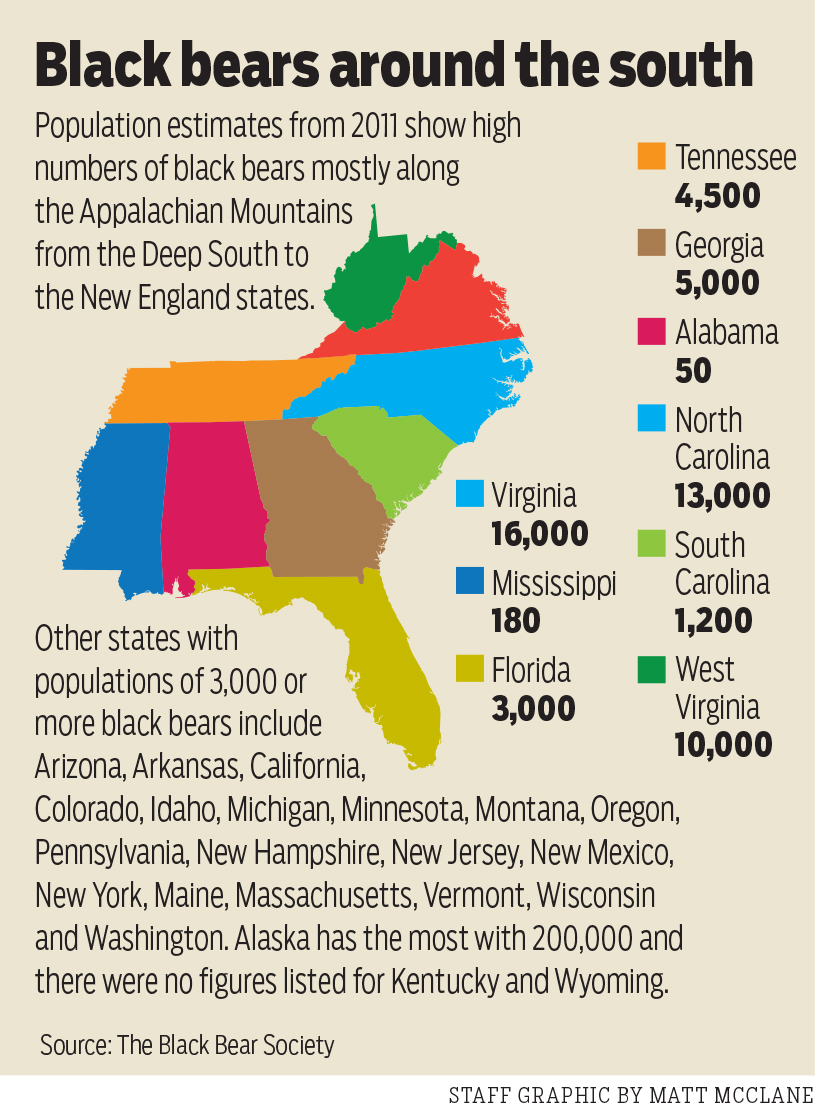WHEN YOU SEE A BEAR
Do not feed or toss food to a bear or any wild animal * Keep children close at hand * Keep pets indoors or in a vehicle or camper * Do not approach a bear * Never surround or corner a bear * Never run from a bear - back slowly away and make lots of noise * Be responsible. Improper behavior on your part may cause the bear to die * In the extreme case that you are attacked by a black bear, try to fight back using any object available. Act aggressively and intimidate the bear by yelling and waving your arms. Playing dead is not appropriate Source: Tennessee Wildlife Resources Agency bear safety procedures
BEAR FACTS
Black bears are only found in North America and exist in at least 40 states and throughout Canada and Mexico. Bears, except for females with cubs, tend to be solitary animals but will tolerate each other when food is plentiful. 2-3 feet: Height at shoulders 4-7 feet: Length from nose to tail Up to 300 pounds: Females' weight Up to 500 pounds: Males' weight 10 to 30 years: Lifespan Source: Defenders of Wildlife
BEAR SAFETY
CABINS AND RESIDENTIAL AREAS * Never leave unattended food or garbage outside * Do not feed birds between April and November unless you use feeders that bears cannot reach * Do not leave pet food outside overnight * Bear-proof bee hives, compost piles and gardens with electric or chain-link fence * Do not leave food scraps on the ground for any animals * If a bear approaches, move people and food indoors immediately CAMPGROUNDS AND PICNIC AREAS Keep a clean site by properly disposing of all garbage, including fruit rinds and cores and aluminum foil or plastic wrap or other containers that have been used to cook or store food Remove food scraps around your site Never leave food or coolers unattended
REPORT BEAR SIGHTINGS/PROBLEMS
Tennessee: If bears present safety or property problems call the Tennessee Wildlife Resources Agency in Southeast Tennessee at 800-262-6704 or in upper East Tennessee at 800-332-0900 or visit tn.gov/twra to find more information. Georgia: Call the Georgia Department of Natural Resources 770-918-6401 or go to georgiawildlife.com to find information on how to deal with bears and other problem wildlife. Alabama: Go to alabamablackbearalliance.org/bear-report or call 800-822-9453 to report a bear sighting.
Officials with the Great Smoky Mountains National Park closed several trails and backcountry campsites in the Hazel Creek section of the park after a bear attacked a teenaged boy Saturday night.
According to park officials, the bear pulled the 16-year-old Athens, Ohio, boy from his hammock at about 10:30 p.m. at a campsite 4.5 miles from the Fontana Lake shoreline near Hazel Creek in North Carolina.
The boy received multiple injuries, including head lacerations, before the father was able to drive the bear off from the area, officials said.
The injured boy and his father hiked to the lakeshore, where campers who had a boat took them to the Cable Cove dock. EMS workers took them to a landing site and a helicopter flew them to Mission Hospital in Asheville, N.C., at approximately 3 a.m. Sunday. The boy remained conscious throughout the incident and was listed in stable condition Sunday afternoon.
Officials said park rangers and wildlife biologists would investigate the scene and clear the area of other campers. The park has closed several trails, including Hazel Creek Trail, Jenkins Ridge Trail, Bone Valley Trail and Cold Spring Gap Trail. Also closed are backcountry campsites 82, 83, 84, 85, 86, and 88.
The Derrick Knob shelter along the Appalachian Trail has also been closed to camping until officials can determine whether recent bear activity there is related.
"While incidents with bears are rare, we ask park visitors to take necessary precautions while hiking in bear country and comply with all backcountry closures," said park Superintendent Cassius Cash. "The safety of our visitors is our No. 1 priority."
Officials said the father and son, whose names were not
released, were on a multiday backpacking trip in the Smokies. Both campers were sleeping in hammocks approximately 10 feet apart and had all equipment, food, and packs properly stored on aerial food storage cables.
Though the investigation into the attack is ongoing, it appears the campers followed all safety recommendations, said Dana Soehn, spokeswoman for the Great Smoky Mountains National Park.
Bear activity is high at this time of year. Spring brings mating season for most wildlife, and it's the time of year when mama black bears kick their sons out of the den. That means bears are wandering through the woods looking for territory and love.
"Right now, it's breeding season so males are really roaming. We're seeing males looking for a mate," said Daniel Powell, coordinator of the Alabama Black Bear Alliance and past president of the Alabama Wildlife Federation.
"In the bear world, males roam and the females stay at home," Powell said.
Wildlife experts in Tennessee, Georgia and Alabama say black bear numbers are on the rise and more people are seeing the animals as their range expands.
The Great Smoky Mountains National Park is home to an estimated 1,500 black bears and the Cherokee National Forest is home to another 1,500 bears. North Carolina's Black Bear Society says the Tarheel state, whose bear population hit a low in the mid-1900s, now has more black bears than Georgia and Tennessee combined.
Tennessee Wildlife Resources Agency spokeswoman Mime Barnes said the agency's biologists are conducting an annual count now. Almost every previous survey in the Appalachian Mountains of Tennessee over the last 10 years shows larger numbers of bears visiting bait stations.
In Georgia, Adam Hammond, wildlife biologist and state bear project leader, said the bear population has been growing for two decades with sightings everywhere, including metropolitan areas.
"We've got bears scattered all across North Georgia," Hammond said. "None of us feel like our bears are in jeopardy. We're even getting a lot of reported activity in the metro Atlanta area."
Alabama has the smallest numbers of black bears among the four states in the Chattanooga region, but DeKalb County's Little River Canyon National Preserve and DeSoto State Park appear now have an established population, Powell said.
With the growth in population comes an unavoidable increase in contact between bears and humans.
Black bear attacks are rare. Only two known fatalities have occurred in the Southeastern United States, both in the Appalachian Mountains of Tennessee, figures show.
Most bear encounters arise from human missteps, officials said. Because the two species don't compete for food these days, humans have become more tolerant of bears, Powell said.
But people's soft spot for wildlife can be the bears' undoing, by erasing their fear of humans.
"People see them as cute," Powell said. "They want to feed them."
But Barnes, Powell and Hammond echo the same bear-saving mantra, "A fed bear is a dead bear."
Staff writer Ben Benton and the Knoxville News Sentinel contributed to this report.
Contact Ben Benton at bbenton@timesfreepress.com or twitter.com/BenBenton or www.facebook.com/ben.benton1 or 423-757-6569.

